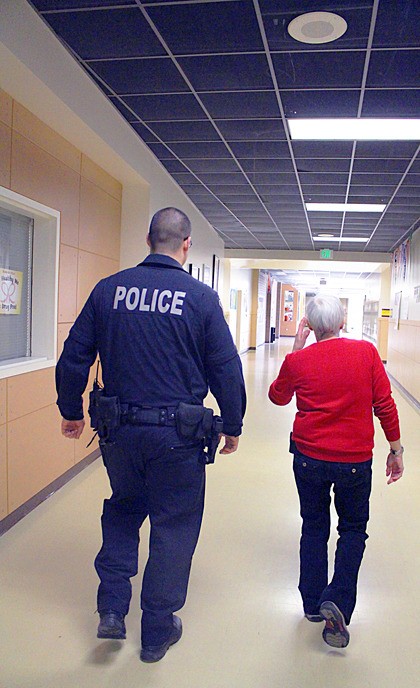Nathan Padrta dons his uniform, holsters his gun and heads to work — at Oak Harbor High School.
He’s the school district’s new school resource officer. He’s the only Oak Harbor police officer with an office at the high school.
It’s a job he said he absolutely loves.
“I enjoy this job,” he said. “I’m excited to come to work in the morning.”
Padrta, at 24, almost looks young enough to be a student. He has the presence of a seasoned officer. He studied criminal justice at Washington State University and one of his first jobs was working at the Whitman County jail. He saw firsthand what a life gone wrong looks like.
In this job, he wants to make a connection with kids and steer them away from mistakes.
“Every one of these kids has potential,” he said. “I see that.”
Oak Harbor Police Department hired Padrta in 2014, and he spent a year as a patrol officer. He described it as challenging work — any call that came in he would answer.
When the school resource officer position opened, Padrta said he was eager to step up. He said he feels as if he can do the most good working with young people.
“It feels like I’m making a difference.”
Oak Harbor is a good fit for him. He finished high school at Colfax, a small town in Eastern Washington. He prefers to work in a small town.
During high school, he was a popular kid who participated in student body leadership and was voted “Mr. Bulldog” — the male equivalent of winning the town pageant.
He described himself as “a goofy kid.”
Starting work as a police officer at a high school was not a cake walk. During his first days at the job, students yelled a few nasty things at him.
He rolled with it.

Padrta said he views his role as partly about being an ambassador. He wants to combat negative stereotypes of police in the media and form positive relationships with young people. The police are here to help, he said.
“It’s inevitable when you turn on TV news, the police are put in a very negative light,” he said. “This gives me an opportunity to communicate with kids.”
“Maybe this isn’t like what you see on TV.”
Padrta’s days are varied. He’s typically in close contact with the high school administration, particularly the deans. He deals with more serious discipline issues but his role is more expansive.
He also works for the entire district and, on any day, he might be visiting one of the middle schools or giving a safety presentation at an elementary school.
He’s prepared to deal with emergencies. He’s training for worse case scenarios, the kind parents don’t want to think about. He’s attending training, for instance, on how to handle a school shooter.
“I want to say that would never happen here,” he said. “But I bet they would have said that in Marysville or Columbine. I would be the first person on scene.”
Barely a month into the job, he was one of the first people on scene when an elderly visitor to the school collapsed and needed CPR. He booked it to the front office to grab a defibrillator that was used to restart the man’s heart.
The hardest part of his job is confronting a student who just doesn’t care, he said. The juvenile justice system is set up to rehabilitate kids and get them back on the right track. Sometimes they just won’t.
“That’s difficult,” he said. “They are throwing away that potential.”
For the police department, having an officer stationed at the high school makes sense.
“The way I look at it is the school district is a population of several thousand kids — it’s a large percentage of our population,” said Police Chief Ed Green.
“It just makes sense to have an officer who is a specialist with kids.”
They also want to break down barriers and let young people see the police aren’t “bad,” he said. “They can see us up close. We’re here to help.”
Padrta’s youth is an advantage, said assistant superintendent Steve King. He brings an innate knowledge of social media and other cultural issues students navigate.
That said, Padrta is also “an old soul.”
“He has an easy way about him,” King said. “He’s young enough to be approachable. Students can connect with him.”
The school district added the school resource officer position in 1997. Having an officer on scene heads off problems, King said.
Pat Felger, a dean at the high school for more than 20 years, said she noticed a perceptible difference in the culture of the high school after an officer was stationed on site.
“Having someone here prevents a lot of problems,” King said.
Padrta has a four-year contract to work at the high school and, for the foreseeable future, that’s where he said he’d like to remain.
“I’m pretty high on this job.”


